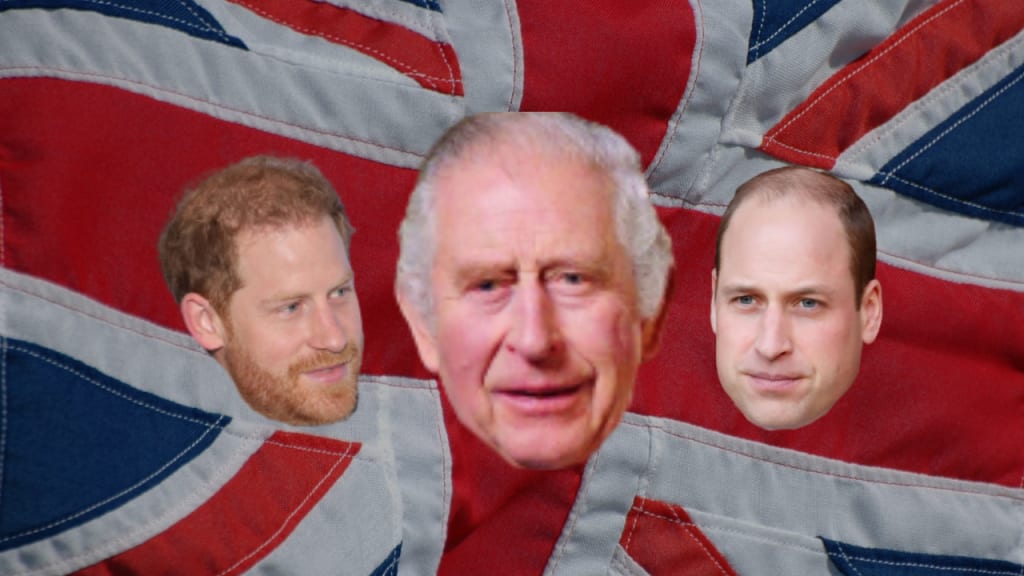Assessing the Royal Family's £86M Annual Expense: Are They a Worthy Investment?
Evaluating the True Value

There's no doubt that the British royal family is rich. If you were to add up all of the land properties and castles linked to the monarchy, you'd end up with assets of around 26 billion pounds. Not to mention the Faberge eggs, the crown jewels, drawings by Leonardo da Vinci and Michelangelo, and one of the most valuable stamp collections in the world. To some, the Windsors are an out-of-date Money Pit that should be consigned to the history books. It is seen as a grubby, secretive, and corrupt institution. While to others, they are The Very Best of British, combining history with majesty and bringing in billions to the country through tourism and business.
Harry and Meghan's exit from the family, known as The Firm, has undoubtedly done damage to the Royal brand. So, how much does the Royal Family cost, and are they worth it? The answer comes down to whether or not you think the Royals cost more than they give back. This is an imprecise science, so bear with me. It might surprise you that, on top of all their wealth, the royal family receives an income from the UK government - over 86 million pounds a year or 106 million dollars. And if you are a senior member of the royal family, you get to live in places like Buckingham Palace.
Buckingham Palace has 775 rooms, and the balcony up there is where you may have seen the royal family gathering for special occasions like weddings, birthdays, and Jubilee celebrations. It's not for sale, but the palace is believed to be worth as much as 4 billion pounds. But here's the thing - Charles couldn't sell it even if he wanted to. Like most royal properties, it is independently managed, meaning that while it may belong to the reigning king or queen, any money it generates through tourism goes to the state.
The Monarch's largest portfolio of land and property is called the Crown Estate, which includes London's iconic Regent Street and the entire seabed around the UK as far as 12 nautical miles from land. That means these valuable wind farms too. The estate even owns shopping malls up and down the country that are home to brands like McDonald's and Victoria's Secret. In 2021, the Crown Estate businesses made a profit of 312.7 million pounds, and again, all of this is paid to the government, not to the Royals.
This arrangement dates back to 1760 when King George III struck a deal with Parliament in which he would give up the earnings from his estates in return for an annual income. That payment is now known as The Sovereign Grant, which covers things like the cost of maintaining the Palaces, paying the wages for over a thousand staff, and Royal travel. In 2022, when William and Kate toured the Caribbean, the flights alone cost 226,000 pounds.
But the Royals do have considerable private wealth too. For example, the King owns a large amount of land and property that stretches right across the country, called the Duchy of Lancaster. William, the Prince of Wales, gets money directly from another portfolio, the Duchy of Cornwall. Together, Charles and William provide a private income of over 40 million pounds a year. Charles inherited Sandringham House and Balmoral Castle in Scotland when his mother died. He is also now the owner of many of the nation's swans, part of a tradition dating back to Medieval Times.
But here's that question again: Are they worth it? Well, there are more costs beyond that annual Sovereign Grant. For a start, there's the undisclosed amount spent by the government on security for every event the Royals attend and every parade. In all, it's estimated that the royal family could be costing the British people anywhere between 300 and 500 million pounds a year. But then, if you start adding up the revenue from the Crown Estate and a string of other economic benefits linked to the monarchy, then they start to look like quite good value for money.
"My name is David Hake, I'm the CEO of Brand Finance," says David Hake. "Brand Finance has tried to put a number on the benefits that the Royals bring to the UK. I wanted to check one factor. There's lots of evidence that the monarchy does create this wealth. Something in the order of 800 million pounds a year is generated every year incrementally to UK tourism because people specifically come here because they want to see royal events. It definitely stimulates air traffic, hotel usage, restaurants, and all that kind of thing."
Brand Finance also accounts for the free advertising Britain gets around the world every time there's a big Royal event like a wedding or a new baby. They also argue that the hundreds of businesses that are endorsed by the Royal household and can use a royal coat of arms reap the benefits in terms of extra sales. Moreover, the crown and the bigger the brand, the bigger the value.
"Our estimation is that the monarchy generates about 2 billion of uplift based on all these various different slivers that we have identified," states David Hake. Taking away the estimated 500 million pounds in costs, according to Brand Finance, that would mean that the UK still gains around 1.5 billion pounds a year from its monarchy.
However, Graeme Smith, CEO of Republic, the campaign to abolish the monarchy in Britain, challenges this economic argument. "For a lot of people, the monarchy was the queen, and the queen was the monarchy. And without her on the throne, a lot of people just aren't that interested." Opinion polls show support for the monarchy as an institution has dipped considerably over the last year. It's not just the change of Monarch; Smith believes recent scandals have devalued the brand Windsor. "The Prince Andrew scandal has done a lot of damage. The fiasco around the exit of Harry and Meghan has done a lot of damage. The accusations have come out from that."
Harry remains a prince, but since moving to California, he and Meghan have given up the income they received from the royal family, turning instead to lucrative book and TV deals. Republic argues that without a royal family, tourists would still come and that an elected head of state would be far more democratic.
Charles wants his coronation to be less lavish than his mother's, but it is still likely to cost the government tens of millions of pounds at a time when people are struggling to put food on the table and being denied cost-of-living pay rises. There may be a lot of resentment and anger. Republic plans to protest at the coronation, but many will be in London to celebrate, while millions around the world will watch the ceremony on TV.
But money aside, many feel that having one single family that passes on wealth and privilege to the next generation without any kind of mandate is just wrong. Others like the sense of stability the Royals represent, especially at a time of political and economic instability. Breaking with tradition won't be easy. Westminster Abbey has been the setting for every royal coronation since 1066.
So, can the royal family survive? "Most people would say the notion of a hereditary ruling family is ridiculous," concludes David Hake. "The monarchy is a very resilient organization. Despite the short-term damage by Andrew and Harry, I think it will sail through. People are inherently conservative and inherently they don't want to change everything."
The monarchy is a very resilient organization, despite the short-term damage caused by Andrew and Harry. People are inherently conservative and generally resistant to major changes. The notion of a hereditary ruling family may be seen as ridiculous by some, but it has endured throughout history. Despite recent scandals, the monarchy is likely to sail through and maintain its position.
It's important to acknowledge that opinions on the monarchy are divided. While some argue that the institution is outdated and should be abolished, others appreciate the stability and historical significance it represents. The debate over the monarchy's worth goes beyond monetary considerations.
Westminster Abbey has been the venue for every royal coronation since 1066, emphasizing the long-standing tradition associated with the monarchy. Breaking away from such traditions and establishing an elected head of state would be challenging. Many people view the royal family as a symbol of stability, especially during times of political and economic uncertainty.
However, it's not just about tradition and stability; it's also about addressing issues of wealth, privilege, and democratic values. Critics argue that having one family pass on wealth and privilege to the next generation without any mandate is inherently unfair. They believe that an elected head of state would be a more democratic alternative.
As Charles prepares for his coronation, there are concerns about the costs involved. While he intends to have a less extravagant event than his mother's coronation, it is still expected to incur significant expenses. At a time when people are facing financial hardships and struggling to make ends meet, there may be resentment and anger towards such expenditures.
Republic, a campaign aiming to abolish the monarchy in Britain, plans to protest at the coronation. They argue that tourists would still visit the country even without a royal family, and the funds allocated for the monarchy could be better utilized to address societal needs. However, many people will still gather in London to celebrate, and the ceremony will attract millions of viewers worldwide.
Ultimately, the debate surrounding the monarchy's value extends beyond economics. It encompasses questions of democracy, tradition, privilege, and the role of a hereditary ruling family in modern society. While economic benefits and tourist attractions contribute to the argument in favor of the monarchy, there are valid concerns and criticisms to consider as well.
Whether the royal family can sustain itself in the long run will depend on various factors, including public opinion, societal changes, and the ability to adapt to evolving expectations. The institution has shown resilience in the face of challenges throughout history, but the future holds uncertainties that may shape the course of the monarchy in the years to come.
About the Creator
Muziwenhlanhla Dlamini
Muzi Dlamini: Captivating author crafting transformative journeys. From gripping thrillers to heartfelt romances, their storytelling leaves an indelible mark. Immerse and experience the magic.






Comments
There are no comments for this story
Be the first to respond and start the conversation.